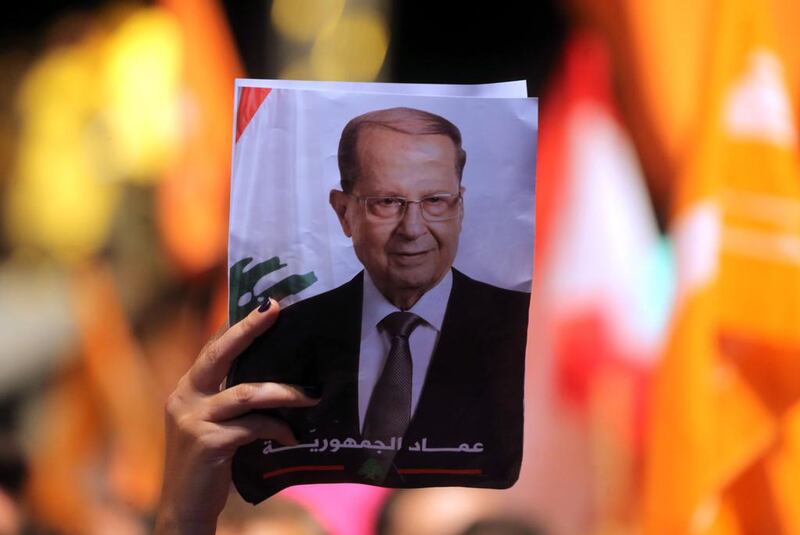The election on Monday of Michel Aoun as Lebanon’s president represents a new phase in Lebanese politics. The political alignments that had characterised the country since 2005 have effectively collapsed, while it’s still not clear what will follow.
A deeply polarising figure, Mr Aoun was chosen after two and a half years during which he and his allies perpetuated a presidential vacuum, in part to allow the political and economic situation in Lebanon to fester and raise the pressure on all parties to vote for Mr Aoun. His victory showed that political blackmail works.
However, two developments in particular finally broke the deadlock: the decision of Samir Geagea, the Maronite Christian rival of Mr Aoun, to rally to him and support his presidential bid and the decision of the main Sunni politician, Saad Hariri, to force his bloc to vote for Mr Aoun, giving him the majority he needed.
Mr Hariri and Mr Geagea had been allies in the March 14 coalition, which was formed in 2005 in the aftermath of the assassination of Rafiq Hariri to oppose a Syrian return to Lebanon. However, during the presidential void last year their relationship was strained, as Mr Hariri, facing tremendous financial difficulties, sought to break the political deadlock by supporting Sleiman Franjieh as president. This alienated Mr Geagea, and explained his shift to Mr Aoun.
Now, the two men, Mr Geagea and Mr Hariri, are together again, with a high likelihood that Mr Hariri will be appointed prime minister this week. How easily he forms a government is a different matter, however, since Hizbollah is wary of the possibility of an Aoun-Geagea-Hariri axis that could affect its fortunes in the state.
That’s not to say that Mr Aoun will abandon his alliance with Hizbollah. In fact it’s highly unlikely he will, but Hizbollah senses, rightly, that the new president has the possibility of leaning on different political forces at different times, therefore widening his own margin of action. Indeed, Mr Aoun, if he manoeuvres properly, can potentially stake out the middle ground, playing off the extremes.
However, that is why Hizbollah appears to have plans to neutralise this. When it was clear that Mr Aoun would triumph, the party gave a wide berth to its Shia ally, Nabih Berri, the powerful speaker of parliament, to declare his opposition to the presidential candidate. Mr Berri has not decided whether to join the government, stating, “If they show something that I like, I will go along with it.”
Hizbollah reportedly tasked Mr Berri with negotiating the government line-up on behalf of what remains of the March 8 coalition, the rival of March 14. This suggested that the party, not to harm its relations with Mr Aoun, anticipated tough bargaining, and preferred the speaker to be in the front line rather than Hizbollah. Moreover, after Mr Aoun had won, Mr Berri took the unprecedented step of making a short speech reminding the new president of what (to him and Hizbollah) were priorities in the coming period.
What Hizbollah apparently seeks to do is create a situation whereby if Mr Aoun ever decides to align with Mr Geagea and Mr Hariri, this can be opposed by Mr Berri and his pro-Syrian allies, leaving the party to seize the middle ground and make political gains. In other words, even before Mr Aoun’s election, Hizbollah had it in mind to contain Mr Aoun’s ability to take actions with which it might disagree.
It’s uncertain what new ideas Mr Aoun himself brings to the table. His inauguration speech was lacklustre, mixing contradictory promises to all sides with boilerplate remarks on the need to address Lebanon’s crises. The president is over 80, and his energy is limited. It could be that Mr Aoun, having won the election, will sit back and do nothing, which, given the limited powers of the president, is hardly impossible.
Nor is it evident how Mr Aoun will address the most urgent problem Lebanon faces today, the ailing economy. The country is caught in a serious downturn, exacerbated by the presence of more than a million Syrian refugees, but also by the fact that it has been governed by a dysfunctional government since 2014. Important economic decisions have been delayed, and the country’s public debt was estimated by the finance ministry at 139 per cent of GDP at the end of 2015.
While Mr Aoun’s supporters believe he will bring positive change, there is a significant likelihood that, at best, his election will allow the state to function somewhat more efficiently, while Lebanon’s challenges continue to be addressed in a haphazard way. Because he is not a unifier, the new president will be buffeted by the political dynamics in the country, rather than driving them himself.
Mr Aoun built his career on causing resounding political bangs, but now that he’s president, it may all end with a whimper.
Michael Young is a writer and editor in Beirut
On Twitter: @BeirutCalling





